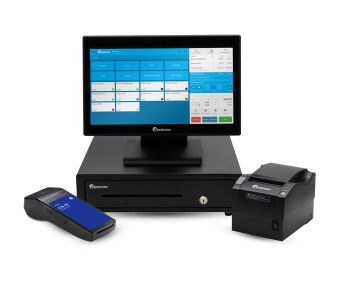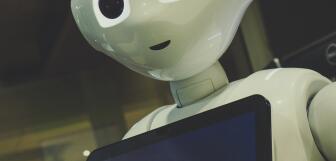Technology in Hospitality: Latest Trends Defining the Industry
Hotels, B&Bs, AirBnBs and businesses across the hospitality industry have long engaged in a competition to provide guests with the most luxurious experiences. Technology has always held a pivotal role in this competition, reducing the need for human involvement, simplifying the guest journey, and impressing people with innovative new solutions to old problems.
Though many hotels across the world are now equipped with clever gadgets previous generations never imagined, the 2020s continue to bring in evermore ingenious gadgets that are helping businesses outshine each other, save money, and create memorable stays for their guests.
From artificial intelligence to virtual reality, what's the latest technology for hospitality? How does it work? What does it achieve? And should you be looking to employ it at your business?
Why does technology matter so much for the hotel industry?
Anyone born in the 20th century will have witnessed how technology can transform our lives. Most people who think of technology will associate it with luxury, comfort, and the advantages it can bring.
The technology could be as simple as the standard electronic kettle most hotel rooms have, which can boil water for your tea or coffee conveniently. Or, it could be as subtle as a cost-effective way of heating a building.
The hospitality industry has high overhead costs, large premises to oversee, and many guests arriving ready to compare each hotel they visit with the others. Technology helps hospitality businesses stay current, reduce operating costs, and attract potential guests.
Which areas of operations can hotel technology improve?
These widespread advantages rooted in technology solutions may not directly affect the customer journey. For instance, rising energy prices have made energy efficiency more crucial than ever.
A visitor may not know how much fuel was used to keep them warm during a stay, a hotel that can reduce their bill by even a few percent might be saving thousands of dollars each year. The same is true for other utilities, such as water and electricity, as well as the wage bill.
Beyond creating a more efficient and economical service, hotel technology can create security, luxury, and convenience for guests, through innovations such as voice-activated appliances. It can improve marketing and customer acquisition with more targeted advertising, integrated PMS and POS systems, smarter booking engine websites, channel management, and other software.
With a dedicated EPOS solution for hospitality, Epos Now technology has the perfect hardware and software options to suit your needs:
- Choose from mobile and fixed terminals, build a site-wide printer network, and benefit from a co-ordinated hardware system
- Select your favoured apps from the hundreds available to create a bespoke set-up for marketing, accounting, booking, management and much, much more
- Control your business with ease using simple staff management, speedy inventory control, streamlined pricing structures on flexible software

5 of the latest hospitality technology trends
While these trends are constantly changing, with new releases and companies providing original takes on each tech solution, many of these trends are new takes on old problems. So let's take a closer look at a few of them:
App, bot, and web-based room service
While very few hotels yet have a robot to fulfil and deliver room service, the ordering process can certainly be automated, reducing the need for a counter-based team to answer phone calls and process the order.
Instead, the same app or web-based ordering software used in restaurants can be applied to the hotel room. This could involve guests scanning a QR code using their smartphone or placing a partially self-service order through a downloaded app or website. Whichever method they use, all the hotel needs to do is put a short set of instructions in the room, load their service options, and include a copy of their menus onto the platform.
The app can be linked to the front desk, the bar, and the kitchen, so the team can pick up the order immediately through a printed ticket, a KDS (kitchen display system), or POS (point of sale) notification.
In-room online ordering results in reduced staffing requirements, faster service, and greater convenience for guests. It also means reduced contact between people, which can make the hotel more hygienic, a pressing concern even after Covid, particularly in hospitality.
Part of the reason these latest technology trends around ordering have taken on so quickly is that despite the savings it makes and the improvement to the service, it's relatively cheap to implement.
The cost of the app or website setup won't require too much money. Beyond that expense, only the room service menu and instructions for the room are necessary, as these apps and websites can integrate into your existing hotel technology.
Chat-bot concierge and AI assistance
While well-trained, hospitable hotel staff remain a staple of the best hotels, many hospitality businesses provide greater availability and convenience to the guest experience through AI and Chatbot front desks.
Only rarely does this mean a literal robot. Rather, most hotels employing AI use a computer screen during check-in to reduce pressure on staff to check in guests.
Alternatively, hospitality companies can provide information to guests in the form of a chatbot online or on a further computer screen in the room. This support can be particularly valuable at night when staff may not be readily available to answer questions.
The chatbot or AI software can still offer any information on the service and the local area, and the latest artificial intelligence can do so in the form of a fluid, human-like conversation.
AI software is becoming widespread across many industries and is quickly becoming more affordable. So while you may have yet to encounter AI in hotels, don't be surprised when you start seeing this emerging technology more and more frequently, providing the information you need, and helping you book, enter, and exit hotels.
The internet of things (IoT)
IoT technology is a promising development for smart hotel technology solutions, offering the chance to create a much simpler experience for guests. The internet of things refers to creating an appliance system operated by a smartphone or voice technology.
IoT is becoming increasingly common in homes, with Amazon's Alexa and Apple's Siri connecting home speaker systems, lights, doors, security, and many other appliances that users operate through voice and mobile apps. Just as people are becoming used to seeing this at home, hotel guests are no longer overwhelmed by this convenience but will soon come to expect this during a stay.
Many will be using voice search and voice recognition technology on the mobile they bring and are becoming accustomed to smart hotels and rooms. In smart hotels, they can benefit from voice-controlled room settings to alter the indoor environment to their preferences and fix themselves a hot drink with just a few short words.
In terms of implementation, newer hotels buying appliances can ensure they purchase products implanted with the necessary software to connect to the room network. At the same time, older businesses may need to slowly implement internet connectivity to the new products they purchase, which may require some expenditure.
Fingerprint or mobile-based keyless doors and facial recognition technology
Perhaps the most stressful element of any hotel or BnB stay is having difficulty with the door to your room. While the hospitality industry cannot afford to risk the security of their rooms, nor can they afford to lock out their own guests.
That's why hospitality tech trends focus on finding the easiest, most secure ways to provide access for customers. Fortunately, hotels can choose from numerous innovative solutions to this problem. These include:
- Mobile-based door locking. Perhaps one of the simpler and cheaper options for customer mobile phones can display a code that the door-locking system can read to monitor access permissions. This is more expensive than simple locks but removes the need for metal keys that customers carry, and thus takes a lot of stress from customers during their stay and does not create the need to replace lost keys. This currently seems to be the most popular alternative to lock and key systems.
- Fingerprint door locking. Fingerprint technology is standard on most mobile phones, and hotel guests are even less likely to lose their fingerprints than they are on their mobile phones. Fingerprint readers, while not cheap, are becoming more affordable, especially if buying in bulk. This makes fingerprint door locking one of the hospitality industry's latest technology trends.
- Facial recognition door locking. Though the least common of those mentioned, facial recognition as a solution to room security is rising. It's not clear just yet how the wider market responds to their faces being read at the door to their rooms. However, some hotels are already employing this latest trend to good effect.
All three of these technology trends have their pros and cons, and it may be that they continue to compete within the hospitality industry for some time. The great advantage of this is that hotels now have options to choose from and can find a method that suits their hotel and improves both convenience and security.
Energy-saving technology
Every owner and manager is always looking to find ways to reduce the cost of hotel operations. Following the rise of energy bills in 2022, energy costs are one of the main concerns, and those bills have taken many in the hospitality sector out of the green and into the red.
There are many different innovations based on saving energy. Smart heating, for instance, can closely monitor the temperature of rooms and can be linked to room occupancy to ensure unoccupied rooms don't receive any unnecessary warmth.
Smart heating can use climate zones in larger buildings or thermostatic radiator valves (TRVs) with tamper-proof radiators that allow the TRV to cut off heating when the room reaches a comfortable level.
Heating is just the beginning, though a crucial beginning, of how energy-saving technology can be employed. Motion-sensitive lighting and automatic triggers have made hotel lighting much more energy efficient and are becoming a standard feature of many hotels.
Effective in hotel rooms and corridors, motion-sensitive lighting switches off after a short period without any movement and quickly lights a space when there is movement. The result is that even public spaces in the hotel are only lit when in use. This hospitality technology has drastically reduced the cost of lighting in hotels as before motion sensors, public areas of hotels would be lit constantly.
While lighting tends to be cheaper than heating, the implementation of motion sensors is fairly cheap and will quickly pay for itself.
Hotels have numerous options when it comes to reducing their energy bill. Sustainable energy sources such as solar panels are similarly effective, especially in warmer climates, and you can expect to see more of them atop hotel buildings in the future.
A few more tech trends for the hospitality industry
There are dozens more innovative ways hotels, restaurants, B&Bs, and other businesses have found to provide their services. While there isn't room to discuss them, here are a few final pieces of hospitality tech you may want to research for your business.
Infra-red scanners
Many people rent rooms not to visit a new town or go out to work but to spend more time in the room than out. For housekeepers, the "Do Not Disturb" sign has long been the way they know whether to enter or not.
Infra-red scanners can scan a room and detect whether it's occupied without intruding on the guest's privacy. This gives the housekeeper a chance to avoid disturbing the guest and skip the room until later. Infra-red scanners designed to work like this are a clever way to help hotel staff work in less disruptive ways and to help the hotel provide a more relaxing, peaceful guest experience.
Translation tech
Room service menus, instructional videos, websites, social media, voice control in rooms, and all other written or spoken words that hotels operate through, depending on the guest and the business being able to understand each other. But the travel industry is as global as it gets, and guests will not always speak the languages of the countries they visit. As a result, hotels have worked to find effective, simple ways of solving the problem of language barriers.
In recent years, tech companies have found ways of programming all languages into translation devices that can understand speakers and translate their words into the local language. The same is being done for written materials on-screen, which can translate into the hotel app or website to ensure guests can read any and all menus, instructions, and guidance.
Virtual reality marketing programs
Virtual and augmented reality software has developed extremely quickly in the last decade. Some of the more upmarket hotels already use augmented reality screens and audio in rooms to allow guests to feel like their room is outdoors on the beach, in a rainforest, or anywhere else the guest chooses.
But one particularly exciting prospect for marketing channel managers is using virtual reality programs on booking engines and in other digital marketing materials. This offers potential guests a virtual tour of the business but allows the guest themselves to take the wheel and "wander" around the hotel from the comfort of their homes.
Equip your hospitality business with the Epos Now technology trend taking the industry by storm
So far as tech trends go, Epos Now's EPOS system can help modernize your business like no other device. With bespoke setups available for companies across the hospitality industry, Epos Now offer flexible hardware and software packages able to integrate with the latest innovations, partnering with PMS providers, accounting software, loyalty programs, and much more.
Epos Now customers benefit from the following:
- Integrate multiple booking platforms and manage them on a sophisticated, centralized system.
- Create your bespoke setup with the latest business software to boost marketing, product, customer and staff management.
- Know your business better with hundreds of modifiable, detailed, downloadable reports accessible from anywhere using a cloud-based system.
- Be supported all the way with an expert team on hand 24/7, bringing you all the options and technology trends, including an in-house payment processing service.
Get in touch with our expert team by submitting your details below, and find out more about the Epos Now hospitality EPOS and retail EPOS system.
You may also like:




